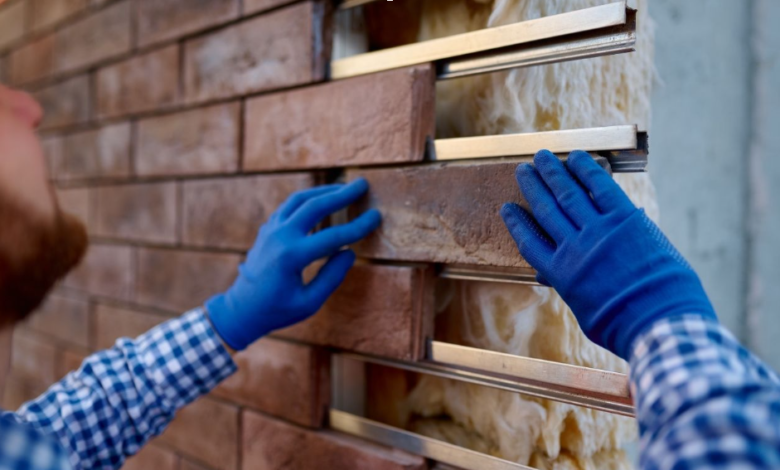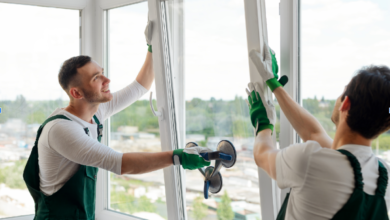Boost Energy Savings with Sacramento Siding Contractor Work

Upgrading your home’s exterior isn’t just about aesthetics—it’s also a smart financial and environmental decision. Among the many enhancements available to homeowners, professional siding installation and upgrades offer one of the most impactful ways to improve your property’s energy efficiency. Partnering with a knowledgeable Sacramento siding contractor ensures that the job is done right, using high-performance materials tailored to your home’s needs and local climate.
This article explores how Sacramento siding contractors can help reduce your energy bills, improve indoor comfort, and protect your investment for the long term. From energy-efficient materials to proper installation techniques, here’s everything you need to know.
Why Siding Matters for Energy Efficiency
The Role of Siding in Home Insulation
Siding acts as the first line of defense against external elements, such as wind, rain, UV rays, and temperature fluctuations. Properly installed siding combined with insulation helps maintain a stable indoor temperature, reducing the strain on your HVAC system.
Thermal Bridging and Heat Loss
Poorly insulated siding or gaps in installation can lead to thermal bridging, where heat escapes through walls. This not only drives up energy costs but also leads to cold drafts and uneven room temperatures.
Moisture Protection
Energy efficiency isn’t just about heat—it’s also about moisture control. A Sacramento siding contractor ensures proper sealing and flashing to prevent water intrusion, which can lead to mold, rot, and reduced insulation effectiveness.
See also: Enjoy Cinema-Quality at Home with Samsung’s latest Smart TVs
Top Energy-Efficient Siding Materials Recommended by Sacramento Siding Contractors
Vinyl Siding with Insulated Backing
Modern vinyl siding comes with insulated backing that adds an extra layer of protection. It’s lightweight, low-maintenance, and highly energy-efficient.
Fiber Cement Siding
While not inherently insulating, fiber cement siding is dense and durable. When combined with a rigid foam board or insulated wrap, it significantly improves a home’s thermal performance.
Engineered Wood Siding
This option offers excellent insulation and durability while maintaining a natural wood appearance. Engineered wood is often treated to resist insects and moisture.
Composite Siding
Composite materials blend polymers with wood fibers or other substances to create durable, energy-efficient options that resist warping and cracking.
Stucco and Stone Veneer with Insulating Layers
Though more expensive, these options can include insulating sheathing for added efficiency. They offer strong thermal mass properties to help regulate indoor temperatures.
Benefits of Hiring a Sacramento Siding Contractor
Local Knowledge and Climate Expertise
A professional Sacramento siding contractor understands the specific weather conditions in the region, including hot summers, mild winters, and occasional rain. This knowledge helps in selecting the right siding material and insulation solutions.
Expert Installation Practices
Energy efficiency depends not just on the material used, but also on how it is installed. Professional contractors use precision techniques to avoid air gaps, ensure proper sealing, and enhance structural integrity.
Access to Premium Products
Most certified siding contractors have relationships with suppliers and can offer energy-efficient siding solutions that may not be available to retail consumers.
Time and Cost Efficiency
Hiring a siding contractor saves time and reduces the risk of costly mistakes. Professionals streamline the process, from planning and permitting to clean-up and final inspection.
Warranty and Quality Assurance
Reputable contractors provide labor warranties along with manufacturer warranties. This gives homeowners peace of mind that the investment is protected.
How Sacramento Siding Contractor Work Reduces Energy Bills
Insulation Integration
Professionally installed siding often includes insulated sheathing or foam board underlayment. This enhances the home’s R-value, which measures resistance to heat flow.
Airtight Sealing
Siding contractors use caulking, flashing, and weather barriers to seal every opening. Preventing air leakage is critical to maintaining energy efficiency.
Reflective and Cool Colors
Some siding products come in reflective or “cool” colors that help bounce sunlight away, reducing heat absorption during hot Sacramento summers.
Reduced HVAC Load
By maintaining a more stable interior temperature, your heating and cooling systems don’t need to work as hard—reducing energy consumption and equipment wear.
Energy-Efficient Siding Installation Process
Step 1: Home Evaluation
The contractor assesses your current siding, checks for water damage, insulation levels, and structural soundness.
Step 2: Material Selection
Based on your budget, goals, and home style, the contractor will recommend the most energy-efficient siding options.
Step 3: Removal of Old Siding
Existing siding is carefully removed to prepare the surface for insulation and new materials.
Step 4: Adding Insulation
Insulated foam boards or weather-resistant barriers are installed before the new siding is applied.
Step 5: Siding Installation
New siding is installed using proper techniques to avoid gaps, buckling, or warping. All joints and edges are sealed.
Step 6: Final Inspection and Cleanup
The contractor performs a quality check, ensures proper clean-up, and provides you with maintenance tips.
Choosing the Right Sacramento Siding Contractor
License and Insurance
Ensure the contractor is fully licensed to operate in California and carries both liability and worker’s compensation insurance.
Customer Reviews and Testimonials
Read online reviews and ask for references. A reliable contractor will have a portfolio of successful projects and satisfied clients.
Transparent Quotes and Contracts
Get detailed written estimates outlining the scope of work, materials, costs, and project timeline. Avoid vague or unclear pricing.
Product Knowledge
A knowledgeable contractor should be able to explain the pros and cons of each siding material and how it affects energy efficiency.
Warranties and Follow-Up Support
Ask about both product and workmanship warranties, and confirm that post-installation support is available if needed.
Environmental Benefits of Energy-Efficient Siding
Reduced Carbon Footprint
Improving your home’s insulation reduces energy consumption, which in turn lowers your carbon emissions.
Sustainable Materials
Many siding products, such as fiber cement or engineered wood, are made from sustainable or recycled materials.
Longer Life Span
High-quality siding lasts longer, reducing the need for replacements and minimizing landfill waste.
Maintenance Tips to Preserve Energy Efficiency
Annual Inspections
Check for cracks, warping, or moisture damage, especially after severe weather.
Clean the Siding
Keep your siding free of dirt, mold, and mildew to maintain its insulating properties and appearance.
Reapply Caulking
Re-seal joints and edges as needed to prevent air leaks and water intrusion.
Paint or Seal (if applicable)
Wood and fiber cement siding may need periodic sealing or repainting to preserve efficiency and durability.
Cost vs. Long-Term Savings
Initial Investment
While energy-efficient siding may cost more upfront, the long-term energy savings make it worthwhile.
Return on Investment (ROI)
New siding can recover up to 80% of its cost in resale value. Add energy savings, and the return becomes even higher.
Financing Options
Many contractors offer financing plans, and energy-efficient upgrades may qualify for local rebates or tax incentives.
Sacramento Climate Considerations
Hot Summers
Siding with reflective coatings and added insulation helps reduce interior heat gain, making your home more comfortable and energy-efficient.
Mild Winters
While Sacramento winters are not severe, having quality siding helps keep warm air inside and cold drafts out.
Rain and Moisture
Properly installed siding with moisture barriers prevents rot, mold, and energy loss due to water intrusion.
FAQs About Energy Efficiency and Siding in Sacramento
How much can I save with energy-efficient siding?
Homeowners can save between 10% and 30% annually on heating and cooling bills, depending on their current siding condition and the new material used.
Do I need to replace insulation when replacing siding?
It’s not always required, but it is highly recommended to add or upgrade insulation during siding replacement for maximum efficiency.
Can all siding materials be energy-efficient?
Yes, when installed with proper insulation and air sealing, most modern siding materials can improve energy performance.
How do I know if my siding is hurting my energy efficiency?
Signs include rising energy bills, uneven indoor temperatures, visible cracks, or drafts near walls.
Is energy-efficient siding worth the cost?
Yes. In addition to reducing energy bills, it enhances comfort, increases home value, and extends exterior lifespan.
Conclusion
Improving your home’s energy efficiency doesn’t have to be complicated or expensive. With the help of an experienced Sacramento siding contractor, you can choose high-performance materials and professional installation practices that significantly reduce energy costs while enhancing your home’s appearance and durability.
From proper insulation and sealing to weather-resistant materials and stylish finishes, smart siding upgrades offer a wide range of long-term benefits. If you’re planning to invest in your home, start from the outside—because a better exterior leads to a more comfortable, efficient, and valuable interior.
Choose wisely, plan thoroughly, and work with a trusted Sacramento professional to transform your home into an energy-efficient haven for years to come.



